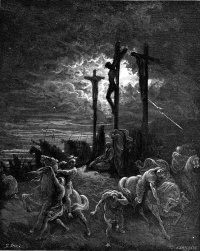Bible
From The Art and Popular Culture Encyclopedia

|
"Does the Bible come within the ruling of the Lord Chief Justice as to obscene literature? Most decidedly it does, and if prosecuted as an obscene book, it must necessarily be condemned, if the law is justly administered." --"Is the Bible Indictable?" (c. 1877) by Annie Besant |
|
Related e |
|
Featured: |
The Bible (from Koine Greek τὰ βιβλία, tà biblía, 'the books') is a collection of religious texts or scriptures, some, all, or a variant of which, are held to be sacred in Christianity, Judaism, Samaritanism, Islam, Baha'i'ism and many other religions. The Bible is an anthology, a compilation of texts of a variety of forms, originally written in Hebrew, Aramaic, and Koine Greek. These texts include instructions, stories, poetry, and prophecies, and other genres. The collection of materials that are accepted as part of the Bible by a particular religious tradition or community is called a biblical canon. Believers in the Bible generally consider it to be a product of divine inspiration, but the way they understand what that means and interpret the text varies.
The religious texts were compiled by different religious communities into various official collections. The earliest contained the first five books of the Bible. It is called the Torah in Hebrew and the Pentateuch (meaning five books) in Greek; the second oldest part was a collection of narrative histories and prophecies (the Nevi'im); the third collection (the Ketuvim) contains psalms, proverbs, and narrative histories. "Tanakh" is an alternate term for the Hebrew Bible composed of the first letters of those three parts of the Hebrew scriptures: the Torah ("Teaching"), the Nevi'im ("Prophets"), and the Ketuvim ("Writings"). The Masoretic Text is the medieval version of the Tanakh, in Hebrew and Aramaic, that is considered the authoritative text of the Hebrew Bible by modern Rabbinic Judaism. The Septuagint is a Koine Greek translation of the Tanakh from the third and second centuries BC; it largely overlaps with the Hebrew Bible.
Christianity began as an outgrowth of Second Temple Judaism, using the Septuagint as the basis of the Old Testament. The early Church continued the Jewish tradition of writing and incorporating what it saw as inspired, authoritative religious books. The gospels, Pauline epistles, and other texts quickly coalesced into the New Testament.
With estimated total sales of over five billion copies, the Bible is the best-selling publication of all time. It has had a profound influence both on Western culture and history and on cultures around the globe. The study of it through biblical criticism has indirectly impacted culture and history as well. The Bible is currently translated or is being translated into about half of the world's languages.
Etymology
From Latin biblia, a collection of books (since there are many books in the Bible), eventually from the ancient Phoenician city of Byblos which exported this writing material.
See also
- Biblical inerrancy
- Gustave Doré's illustrations for La Grande Bible de Tours (1865)
- Biblical stories
- Illustrated bible
- Gutenberg Bible
- Religious text
- Biblical studies
- Biblia pauperum
- Code of Hammurabi
- Sola scriptura
- List of major biblical figures


